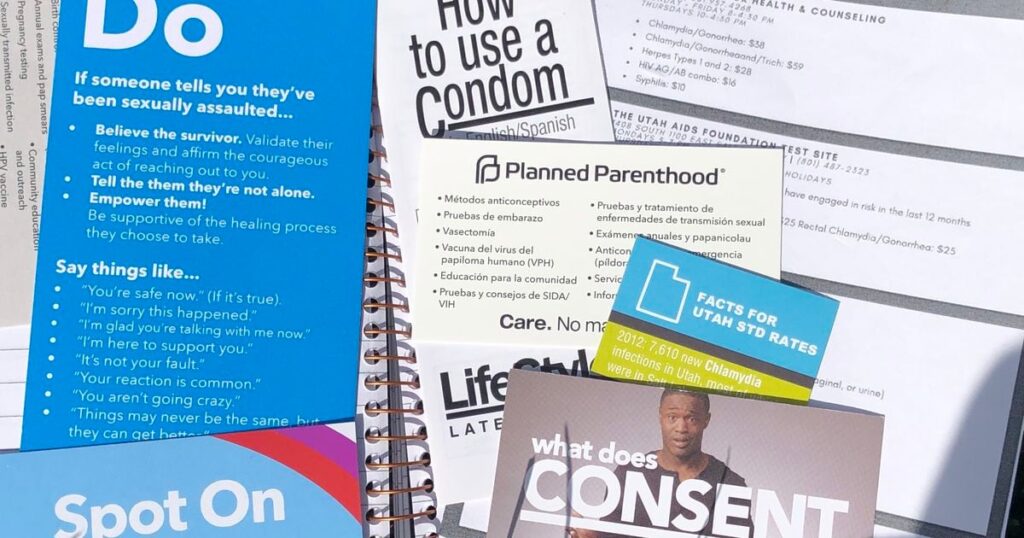Children's right to sex education is too important to be violated by opt-in policies that create barriers and prevent students from accessing important information.
(Alexi Zollinger | Amplify Utah) The Gender and Sexuality Student Resource Center and the Health and Counseling Center provide informational materials about sex education to students at Salt Lake Community College.
Parents support sex education in schools. However, the opt-in policy puts students at risk of not getting this information at all.
Most people agree that the first place children should learn about sex, sexuality, and what it entails is at home. And while many parents are willing to accept the discomfort of an initial (possibly) awkward conversation, some parents and caregivers choose not to talk to their children about sex. For children who cannot “talk” at home, the classroom is the only source of information.
When it comes to sex education, most states have an opt-out policy, meaning parents can remove their children from class if they don't want to participate. However, Utah is one of the few opt-in states in the country.
So what happens if the parent does not give written permission for the child to participate in the sex education section of the health class?
Opt-in policies create barriers that prevent students from accessing the sex education they are entitled to. Opt-in Her policy requires teachers to have written permission from parents to allow students to participate in sex education classes. Additionally, this policy places a burden on school staff as these forms must be processed before class. Opt-in consent would exclude children from sex education. This is because such consent forms may not reach the parents or be returned to the school.
Nationally, sexually transmitted infections have increased significantly over the past 20 years. The Centers for Disease Control and Prevention shows a 505% increase in primary and secondary syphilis cases and a 481.3% increase in chlamydia cases. These numbers are high, and research shows that reduced efforts at sexually transmitted disease education before the pandemic may have led to this spike in cases.
Utah is no exception, with sexually transmitted infections increasing by 291% since 2020. Youth ages 15 to 24 make up only 16.3% of Utah's population, but they accounted for nearly 60% of chlamydia cases reported in 2020.
Research has shown that medically accurate and comprehensive sex education reduces sexual risk behaviors and the risk of sexually transmitted infections. These statistics highlight the need for comprehensive sex education to address and alleviate the alarming rise in sexually transmitted infections, both nationally and in Utah, especially among young people. This is one of the many reasons schools should switch to opt-out.
Proponents of opt-in policies argue that they give parents control over the information their children receive about sex education. The reality is that parents have a say under both opt-in and opt-out policies. In the latter case, schools must inform parents of what sex education lessons will be held, and parents are responsible for informing the school if they do not want their child to attend. According to SIECUS data, only 5% of parents exercise the option to remove their children from sex education classes.
Research also shows that parents support sex education in schools. But what happens if a parent forgets to sign the opt-in form? When I worked as a sex educator, my students were eager to attend class, but their parents were juggling multiple jobs. I remember often forgetting to sign written permission forms. Many of these students were from marginalized backgrounds, and their parents were just trying to make a living. This is where the system is failing students and parents. By switching to opt-out, schools ensure that most students receive the information they need to make healthy decisions.
Children's right to sex education is too important to be violated by opt-in policies that create barriers and prevent students from accessing important information. The alarming rise in sexually transmitted infections emphasizes the urgency of making sex education an opt-out approach and ensuring students have the knowledge and tools they need to make informed decisions. As well as empowering parents, this change will support people from marginalized backgrounds who may face additional challenges in the current system.
It’s time to prioritize the well-being of our children and make Utah an opt-out state.
Meda del Carpio Morgan He lives in Utah, is a former health educator, and is currently a doctoral student in public health at Tulane University.
The Salt Lake Tribune is committed to creating a space where Utahns can share ideas, perspectives and solutions to move our state forward. To do this, we need your insight.Find a way to share your opinion herePlease contact us by email below. voice@sltrib.com.


